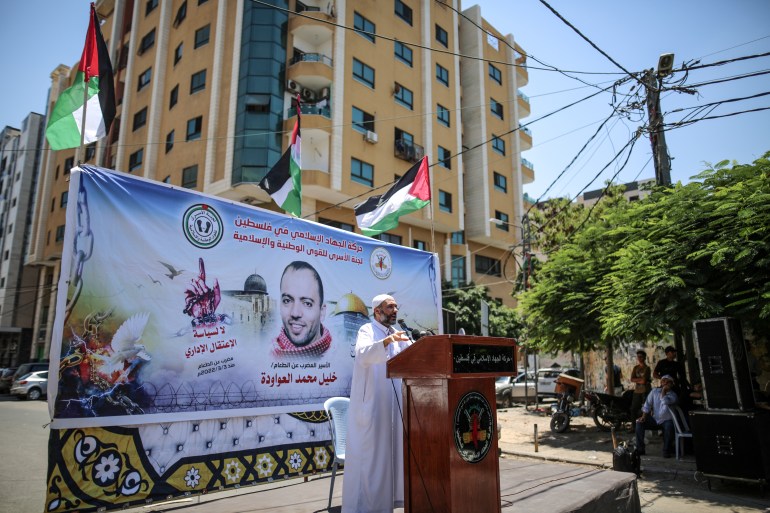The Israeli occupation army announced that the Israeli Supreme Court has suspended the administrative detention of Palestinian prisoner Khalil Awawda, who has been on hunger strike for 161 days, about two weeks after the truce in Gaza.
Awadeh's health had deteriorated sharply last week, which necessitated his transfer to the hospital, and the Prisoners' Affairs Authority warned of the consequences of his sudden death, while his wife, Dalal Awawda, who visited him in the past few days in the hospital, confirmed that he is unable to move, speak and see.
The Islamic Jihad movement had stipulated the release of Khalil Awawda and its leader, Bassam al-Saadi, in the agreement that ended the recent Israeli attack on the Gaza Strip.
The ceasefire statement on August 7, of which Al Jazeera had obtained a copy, specifically stated that Egypt will exert its efforts and commit to work to release the prisoner Awawda and transfer him for treatment.
The statement also added that Egypt is working to release the leader of the Islamic Jihad Movement, Sheikh Bassam Al-Saadi, as soon as possible.
In the first reactions to the Israeli decision, the head of the Palestinian Prisoners Club, Qaddoura Fares, questioned the Israeli decision and said that the freezing does not mean the end of Awadeh's administrative detention, but it does mean releasing prisons and intelligence responsibility for his life.
He considered that the decision to freeze came “based on medical data and reports from the hospital indicating a danger to his life, but if his health condition improves and the detainee decides to leave the hospital, his administrative detention will be activated immediately.”
He added that the freezing of Awawda's detention prevents his family from accompanying him and preempts the Israeli Supreme Court session next Sunday to consider a petition submitted to it against his arrest, and it is likely that the decision will be only to calm the tense situation.
He said that Israel operates under old emergency laws that are not used in the implementation of arrest procedures, and warned in an interview on Al Jazeera of Israeli efforts to convert it from an emergency law to a civil law through the Knesset.
He pointed out that Awawda's arrest should not have continued one day after the ceasefire in Gaza, considering that the Israeli decision to freeze Awawda's arrest would embarrass the Egyptian mediator.
Islamic Jihad stipulated the release of Khalil Awawdeh and its leader Bassam Al-Saadi in the agreement that ended the escalation in the Gaza Strip (Anatolia - Archive)
For her part, the prisoner's lawyer said that Awawda will not stop his hunger strike because he is asking for his release and not a freeze of his detention.
Awawda had previously obtained a similar decision, and his administrative detention was re-arrested.
In turn, the media director of the Palestinian Prisoners Club, Amani Sarhana, confirmed to Anadolu Agency that Awawda will continue his open hunger strike, because the freezing decision does not mean canceling the arrest.
Administrative detention is a decision to imprison by an Israeli military order, alleging the existence of a “secret file” for the detainee, without filing an indictment, and extends for 6 months that can be extended several times.

